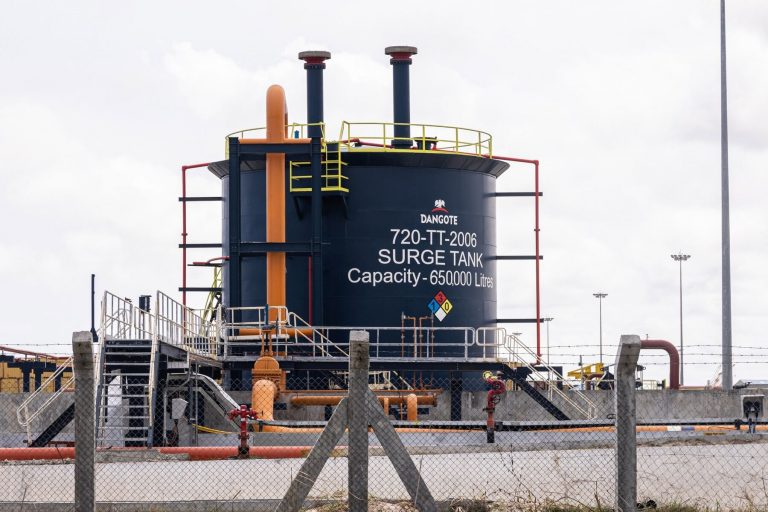
The Dangote Refinery, Africa’s largest refinery project, has begun to supply petroleum products across West Africa, according to reports.
The tanker CL Jane Austen, spotted off Togo waters, transported over 300,000 barrels of petrol from the Lagos-based refinery, signaling the facility’s increasing production capacity and ambition to reshape regional fuel markets.
The refinery, with a processing capacity of 650,000 barrels per day (bpd), has been touted to disrupt the petroleum supply market in Africa and Europe, significantly curtailing Nigeria’s dependence on fuel importation.
Tekedia Mini-MBA edition 16 (Feb 10 – May 3, 2025) opens registrations; register today for early bird discounts.
Tekedia AI in Business Masterclass opens registrations here.
Join Tekedia Capital Syndicate and invest in Africa’s finest startups here.
The refinery has also made strides in overcoming domestic market challenges. The Independent Petroleum Marketers Association of Nigeria (IPMAN), a key player in Nigeria’s downstream petroleum sector, recently reached an agreement with the refinery to purchase 60 million liters of Premium Motor Spirit (PMS) per week.
This agreement puts an end to the perceived apathy shown earlier by local marketers, who Dangote accused of choosing to import dirty petroleum products from Malta instead of buying from the refinery. The deal with IPMAN is expected to help stabilize Nigeria’s fuel supply chain, which has long been plagued by inefficiencies.
The shipment off Togo represents just the beginning of what could become a robust export strategy. Lomé’s waters, a hub for ship-to-ship (STS) transfers, suggest the petrol could be redistributed to other African or even international markets. Although the shipment is small by global standards, it marks a significant step in the refinery’s operational timeline. Analysts view this as a precursor to larger export volumes that could disrupt regional fuel markets.
Neighboring countries eager to reduce their reliance on distant suppliers are poised to benefit from Dangote’s offerings.
Eight African countries, including Ghana, Benin, Togo, and South Africa, have expressed interest in sourcing petroleum products from Dangote. Ghana, in particular, has been vocal about the economic benefits of importing from Nigeria rather than Europe. According to Ghana’s chief oil regulator, Mustapha Abdul-Hamid, this shift could lower freight costs, stabilize the market, and ease foreign exchange pressures.
“If the refinery reaches 650,000 bpd capacity, all that volume cannot be consumed by Nigeria alone,” Abdul-Hamid noted. “Instead of importing from Rotterdam, it will be much easier for us to import from Nigeria, which I believe will bring down our prices.”
The refinery has already made headlines with its earlier seaborne shipment to Lagos, highlighting its dual focus on serving both domestic and international markets.
Overcoming Domestic Monopolies
Until recently, the Nigerian National Petroleum Company Limited (NNPCL) monopolized the purchase of refined products for domestic use. However, with this monopoly lifted, the refinery has a clearer path to supply both local and regional markets.
The IPMAN agreement to purchase 60 million liters of PMS weekly pinpoints this newfound market openness.
Despite being Africa’s leading oil producer, Nigeria has long imported nearly all its fuel due to inadequate refining capacity. The $20 billion Dangote Refinery aims to close this gap, offering a sustainable solution to one of Nigeria’s most persistent economic challenges. As it scales up production, the refinery is expected, among other things, to save the country billions in foreign exchange and stabilize domestic prices.
Pricing and Export Concerns
While the refinery’s products are expected to be more cost-effective than imports, there are concerns about pricing. Local marketers claimed it’s cheaper to import fuel from Europe than to buy from Dangote Refinery.
However, there is concern that, while the refinery is yet to attain full production capacity, exporting to other countries now will scuttle its ability to meet domestic demands. But many believe that the IPMAN agreement is crucial for ensuring that a significant portion of the refinery’s output remains in Nigeria to meet local demand.
However, energy analysts said balancing domestic needs with lucrative export opportunities will be key to the refinery’s long-term success.



